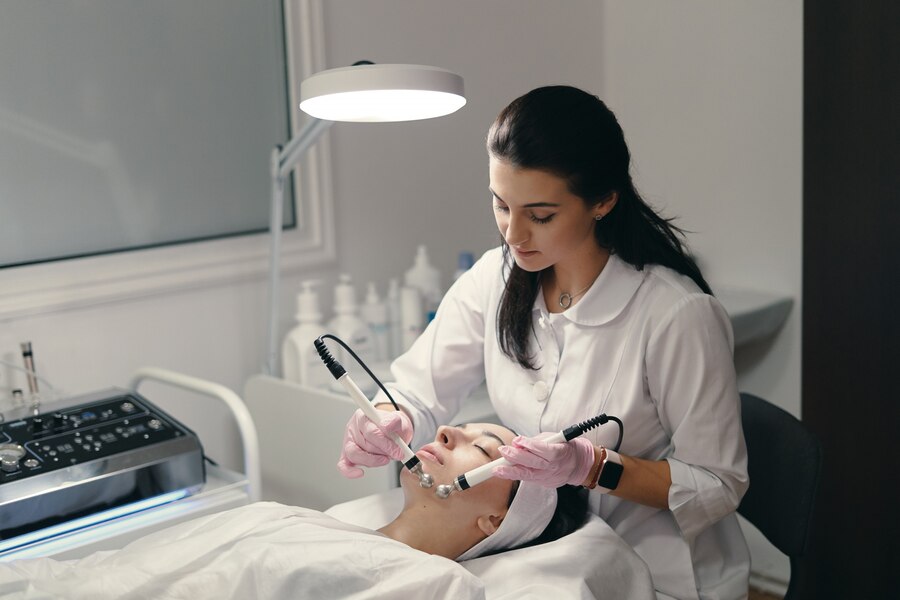The Role of Dermatology Services in Skin Cancer Prevention

In the realm of healthcare, few specialties are as crucial in the battle against skin cancer as dermatology. With skin cancer rates on the rise globally, the role of dermatology services in prevention, detection, and treatment has become increasingly paramount.
Dermatologists serve as frontline guardians, equipped with specialized knowledge and tools to identify potential skin abnormalities, educate patients about risk factors, and advocate for preventive measures. Through regular screenings, they play a pivotal role in early detection, which is often the key to successful treatment outcomes. Moreover, dermatologists contribute significantly to public health initiatives by raising awareness about sun safety practices and promoting the importance of routine skin examinations.
In this blog series, we delve into the multifaceted role of dermatology in combating skin cancer, exploring the latest advancements, challenges, and proactive strategies aimed at saving lives and preserving skin health.
Early Detection: The Cornerstone of Skin Cancer Prevention
Early detection serves as the cornerstone of effective skin cancer prevention strategies. By identifying suspicious lesions at their earliest stages, dermatologists can intervene promptly, significantly improving treatment outcomes and prognosis. Through routine skin examinations and education on self-monitoring techniques, individuals can become proactive participants in their own health, enabling the detection of abnormal changes that may signify the onset of skin cancer.
Furthermore, early detection minimizes the need for invasive treatments, reducing associated morbidity and mortality rates. Emphasizing the importance of regular screenings and prompt evaluation of concerning skin abnormalities underscores the critical role that early detection plays in mitigating the impact of skin cancer on individuals and communities alike.
By prioritizing vigilance and proactive healthcare practices, we can effectively combat the prevalence and severity of skin cancer cases, ultimately saving lives and preserving skin health.
Skin Cancer Risk Assessment: Understanding Individual Vulnerabilities
Understanding individual vulnerabilities to skin cancer is paramount in developing tailored prevention strategies. Dermatologists employ various risk assessment tools to evaluate factors such as skin type, sun exposure history, family history of skin cancer, and presence of certain genetic predispositions. By comprehensively assessing these risk factors, dermatologists can identify high-risk individuals who may benefit from targeted interventions and heightened surveillance measures.
Additionally, risk assessment enables healthcare providers to offer personalized recommendations for sun protection, lifestyle modifications, and screening frequency based on an individual’s unique risk profile. Through proactive risk assessment and mitigation strategies, dermatology services empower patients to take proactive steps towards reducing their risk of developing skin cancer, ultimately fostering a culture of skin health awareness and prevention within communities.
Sun Safety Education: Empowering Patients for Prevention
Sun safety education empowers patients to protect their skin from harmful UV radiation, reducing the risk of skin cancer. Dermatology services play a crucial role in disseminating sun safety information and promoting healthy behaviors.
- Proper sunscreen application: Educating patients on the correct application of sunscreen to ensure optimal protection against UV radiation.
- Seeking shade: Encouraging individuals to seek shade during peak sun hours to reduce direct exposure to harmful UV rays.
- Protective clothing: Advising patients to wear clothing that provides adequate coverage to shield their skin from the sun’s damaging effects.
- Avoiding indoor tanning: Educating individuals about the dangers of indoor tanning and discouraging the use of tanning beds to prevent skin cancer.
- Community-wide initiatives: Supporting public health campaigns and advocacy efforts to promote sun safety awareness and implement policies that prioritize skin cancer prevention.
Sun safety education is vital for preventing skin cancer, empowering individuals to take proactive steps to protect their skin. Through education and advocacy efforts, we can create healthier environments that prioritize skin health and reduce the burden of skin cancer within communities.
Routine Skin Examinations: The Importance of Regular Check-Ups
Regular skin examinations conducted by dermatologists are vital for the early detection of skin cancer. These examinations involve a comprehensive evaluation of the skin, including a thorough inspection of moles, lesions, and any other abnormalities that may indicate potential skin cancer development. By scheduling routine check-ups, individuals can proactively monitor changes in their skin and promptly report any concerning findings to their dermatologist.
Early detection allows for timely intervention, which can significantly improve treatment outcomes and reduce the morbidity associated with advanced skin cancer. Dermatology services emphasize the importance of regular skin examinations as a proactive measure for maintaining skin health and reducing the burden of skin cancer within communities.
Dermatoscopy: Enhancing Accuracy in Skin Cancer Diagnosis
Dermatoscopy, also called epiluminescence microscopy, is a non-invasive diagnostic tool using a handheld device called a dermatoscope. It magnifies and illuminates the skin, aiding dermatologists in visualizing structures beneath the surface. This technique enhances the accuracy of skin cancer diagnosis, allowing for precise differentiation between benign and malignant lesions.
By minimizing the need for biopsies and reducing misdiagnosis risks, dermatoscopy expedites diagnosis, improves accuracy, and facilitates prompt treatment initiation for suspected skin cancer cases. Incorporating dermatoscopy into clinical practice underscores dermatologists’ dedication to delivering top-notch care and optimizing patient outcomes in the battle against skin cancer.
Mole Mapping: Advanced Techniques for Monitoring Changes
Mole mapping is an advanced technique for monitoring changes in moles and detecting early signs of melanoma. By capturing high-resolution images of the skin’s surface, dermatologists can identify new or changing moles that may indicate skin cancer development.
- Comprehensive Monitoring: Capturing detailed images of all existing moles and lesions on the body’s surface.
- Early Detection: Identifying new or changing moles that may indicate the development of skin cancer.
- Personalized Care: Tailoring monitoring and treatment plans based on an individual’s unique risk factors and medical history.
- Family History Assessment: Evaluating familial risk factors for melanoma and guiding appropriate preventive measures.
- Improved Outcomes: Facilitating timely intervention and reducing the risk of disease progression through proactive monitoring.
Mole mapping is vital for early skin cancer detection. Consult a dermatologist for personalized monitoring and preventive care.
Biopsy Procedures: Confirming Suspected Lesions for Timely Intervention
Biopsy procedures are essential for confirming suspected skin cancer lesions and guiding appropriate treatment decisions. Dermatologists may perform various types of biopsies depending on the size, location, and characteristics of the lesion, including shave biopsies, punch biopsies, and excisional biopsies. Following the biopsy, the tissue sample is examined under a microscope by a pathologist to determine the presence of cancerous cells and the type of skin cancer present.
This information is critical for developing a personalized treatment plan tailored to the individual’s specific diagnosis and disease stage. By confirming suspected lesions through biopsy procedures, dermatology services ensure timely intervention and appropriate management of skin cancer, thereby optimizing patient outcomes and reducing the risk of disease progression.
Patient Advocacy: Promoting Sun Protection and Lifestyle Modifications
Patient advocacy plays a vital role in promoting sun protection and encouraging lifestyle modifications to reduce the risk of skin cancer. Dermatology services advocate for public health initiatives aimed at raising awareness about the importance of sun safety practices and encouraging behavioral changes to minimize UV exposure. This includes advocating for policies that regulate indoor tanning facilities, promoting the use of protective clothing and sunscreen, and educating individuals about the dangers of excessive sun exposure.
Additionally, dermatologists work closely with community organizations and policymakers to implement programs and initiatives that support skin cancer prevention efforts at the local, national, and international levels. By championing patient advocacy, dermatology services empower individuals to take proactive steps towards protecting their skin and reducing their risk of developing skin cancer.
Genetic Counseling: Identifying Familial Risk Factors for Skin Cancer
Genetic counseling is essential for identifying familial risk factors for skin cancer and empowering individuals to make informed decisions about their health. Through personalized recommendations and supportive guidance, genetic counselors play a crucial role in helping individuals understand their genetic predisposition to the disease.
- Identify Familial Risk Factors: Evaluate family history and genetic predisposition to skin cancer.
- Understand Inheritance Patterns: Learn about specific gene mutations associated with skin cancer.
- Personalized Recommendations: Receive tailored guidance for screening, prevention, and lifestyle modifications.
- Supportive Environment: Discuss concerns and ask questions in a supportive setting.
- Empower Informed Decision-Making: Take charge of your health and reduce your risk of skin cancer.
Genetic counseling empowers individuals to take proactive steps towards preventing skin cancer by understanding their familial risk factors and making informed decisions about their health.
Collaborative Care: Dermatology’s Role in Multidisciplinary Cancer Prevention Programs
Collaborative care models involving dermatology play a pivotal role in multidisciplinary cancer prevention programs aimed at reducing the burden of skin cancer within communities. Dermatologists collaborate with other healthcare professionals, including primary care physicians, oncologists, genetic counselors, and public health officials, to develop comprehensive prevention strategies that address the diverse needs of individuals at risk for skin cancer.
This may involve implementing population-based screening initiatives, conducting outreach programs to underserved communities, and advocating for policy changes to promote sun safety and skin cancer prevention. By fostering collaboration among various stakeholders, dermatology services enhance the effectiveness of cancer prevention efforts and maximize their impact on reducing the incidence and mortality of skin cancer.
Through a coordinated approach to care, dermatologists contribute significantly to the broader public health goal of reducing the global burden of skin cancer and improving overall health outcomes for individuals and communities.
The battle against skin cancer demands a multifaceted approach that encompasses early detection, risk assessment, education, and proactive intervention. Dermatology services serve as the frontline defenders in this fight, offering a range of specialized techniques and treatments designed to promote skin health and prevent the onset and progression of skin cancer.
From routine skin examinations to advanced diagnostic tools like dermatoscopy and mole mapping, dermatologists employ cutting-edge technologies to identify suspicious lesions and guide timely intervention. Additionally, patient advocacy, genetic counseling, and collaborative care models further strengthen our collective efforts in combating skin cancer on both individual and community levels. At American Laser Med Spa in Corpus Christi, TX, we are committed to empowering individuals to prioritize their skin health and take proactive steps towards preventing skin cancer.
Remember, looking good feels great, and together, we can expose the beauty we have on the inside, on the outside. Take charge of your skin health today! For inquiries or appointments, contact us at Corpus Christi 7426 S. Staples St. #103, Corpus Christi, TX 78413 or call 361-993-5400 or email corpuschristi@americanlaser-medspa.com.







